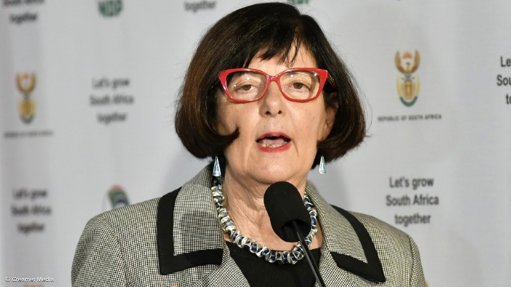
Forestry, Fisheries and the Environment Minister Barbara Creecy
As South Africa progresses on its just energy transition (JET) journey, there are several areas on which stakeholders have agreed, while others require further debate, consideration and acknowledgement.
This was indicated by Forestry, Fisheries and the Environment Minister Barbara Creecy, summing up a panel discussion during the Presidential Climate Commission (PCC) National Colloquium on long-term electricity planning and the just transition, held on April 14.
The colloquium reviewed the PCC’s recommendations to government on national electricity planning as South Africa reviews its Integrated Resource Plan (IRP).
The colloquium follows a series of information and consultation sessions that the PCC has been facilitating with South Africa’s social partners – business, civil society, government and labour – as well as youth and the faith community.
The colloquium brought together a range of stakeholders to actively engage on the PCC’s recommendations on South Africa’s electricity generation mix and governance, and its JET investments.
The electricity recommendations will be submitted to government by the PCC in the second quarter, in support of the ongoing national just transition process.
The panel agreed on several issues. Firstly, as the country moved forward with the discussion on the Just Energy Transition Investment Plan (JET-IP), and on the future of the IRP, it must align with scientific recommendations and the targets the country had committed to.
Secondly, and relatedly, the panel agreed that climate justice was an imperative. Creecy averred that it was now acknowledged that the industrialisation of the developed world over the past decades had caused the current situation, and now, the questions that must be answered are who would pay the price for that, and who would carry the risks of transitioning, as well as who would benefit from it.
She emphasised that developed countries having to finance the transition in developing countries was not a handout, but rather, part of their obligations as signatories to the Paris Agreement, because of them having caused the problem.
In a domestic context, Creecy said the question arose as to who would benefit. She emphasised that, as alluded to by the panellists, those working in the coal value chain, and vulnerable communities such as the youth and women, who would be most impacted and carry the high risk of the transition, must benefit. She called for strong voices in these communities to enable them to participate.
Moreover, Creecy said, further to these groups benefitting in terms of programmes and projects, society as a whole must benefit from new forms of industrialisation and wealth creation that would assist the country in dealing with its triple challenges of poverty, inequality and unemployment.
She also highlighted that climate justice was an intergenerational issue.
Thirdly, panellists agreed that there must be cognisance that there was a major energy crisis in the country, specifically in undertaking energy planning. The transition must, therefore, tackle the difficult question of how to make energy accessible, at a sustainable price, in an environment-friendly manner.
Creecy averred that new generation capacity was required and must be brought onstream expeditiously, and must be affordable for all, and sustainable.
However, this was challenging, she acknowledged, pointing to the many debates around the best ways to undertake this.
Creecy pointed out that what needed to be discussed was what plans in the JET-IP to upgrade the grid looked like in practice, and what it meant to build these partnerships.
The role of local government was also mentioned. Creecy highlighted its importance when moving forward in the JET, given that historically, electricity had been provided by municipalities and they were dependent on this for their revenue.
It was noted that as energy reform was considered, it must not further collapse already burdened local government, and that consideration must also be given to local municipalities’ revenue streams in the context of different streams from energy generation.
This, it was noted, is important, to prevent vandalism.
The panel noted that debate and discussion were necessary and important to build a consensus. However, implementation of plans was required now, with a lack of this being a persistent issue in the country.
National Union of Metalworkers of South Africa general secretary Riefda Ajam emphasised the importance of building trust through the process, and throughout engagements. She noted that before, stakeholders had not been given equal importance in planning and that this needed to be rectified to ensure a proper, equal partnership.
The issue of finance was also raised. Climate activist Otsile Nkadimeng, delivering a perspective from the youth, emphasised that there must be greater transparency as to the amount that is needed to finance the JET, and where this is going to come from.
Speakers emphasised the need to build on areas of agreement, and debate to reach consensus on others.
Creecy also posited that there was a need for all stakeholders to learn from each other, and for the country to learn from other countries as well.